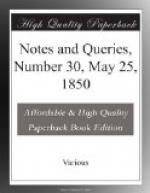“A.D. 1713, 12.”
“Thomas King born at West Ashton in Wiltshire; went away scholar, in apprehension that his fellowship {494} would be denied him, and afterwards kept that coffee-house in Covent Garden which was called by his own name.”
J.H.L.
Spur Money (No. 23. p. 374, and No 28. p. 462.).—In a curious tract, published in 1598, under the title of The Children of the Chapel stript and whipt, we have the following passage:—
“Wee think it very necessarye that every quorister sholde bringe with him to churche a Testament in Englishe, and turne to everie chapter as it is daily read, or som other good and godly prayer-booke, rather than spend their tyme in talk and hunting after spur-money, whereon they set their whole mindes, and do often abuse dyvers if they doe not bestowe somewhat on them.”
In 1622, the dean of the Chapel Royal issued an order by which it was decreed—
“That if anie Knight, or other persone entituled to weare spurs, enter the chappell in that guise, he shall pay to y’e quiristers the accustomed fine; but if he command y’e youngest quirister to repeate his Gamut, and he faile in y’e so doing, the said Knight, or other, shall not pay y’e fine.”
This curious extract I copied from the ancient cheque-book of the Chapel Royal.
Within my recollection, His Grace the Duke of Wellington (who, by the way, is an excellent musician) entered the Royal Chapel “booted and spurred,” and was, of course, called upon for the fine. But His Grace calling upon the youngest chorister to repeat his GAMUT, and the “little urchin” failing, the impost was not demanded.
EDWARD F. RIMBAULT.
* * * * *
MISCELLANEOUS.
NOTES ON BOOKS, CATALOGUES, SALES, ETC.
Mr. W.S.W. Vaux, of the department of Antiquities, British Museum, has just published a very interesting little volume under the title of Nineveh and Persepolis: an Historical Sketch of Ancient Assyria and Persia, with an Account of the recent Researches in those Countries. The work is illustrated with numerous woodcuts; and the two points which Mr. Vaux has proposed to elucidate,—viz., 1. The history of Assyria and Persia, and, as connected with it, that of the Medes, the Jews, and the Chaldees, so far as it can be ascertained from the Bible, and the works of classical authors: and 2. The results of those inquiries which have been carried on for nearly three centuries by European travellers,—he has successfully accomplished, in a way to make his book a most useful introduction to the study of the larger works which have been written upon this important subject; and a valuable substitute to those who have neither the means to purchase them, nor time to devote to their perusal.




